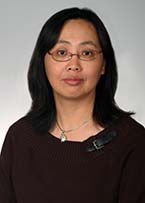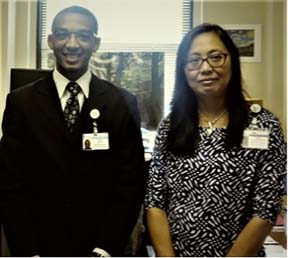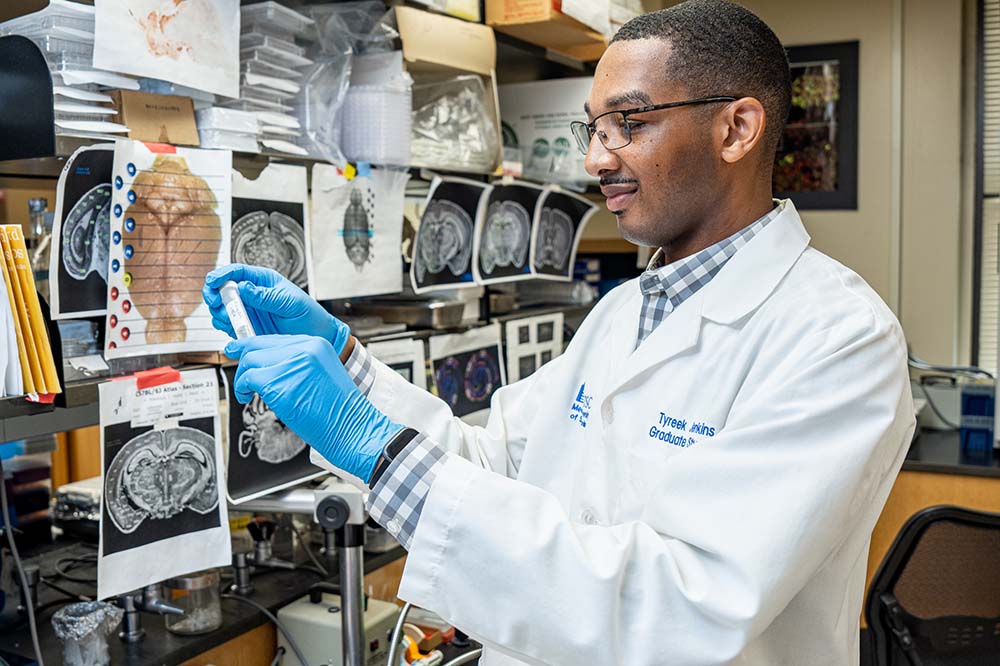Sometimes, it takes just one teacher to recognize promise in a student and set the young scholar on a path to excellence. For Tyreek Jenkins, it was a high school biology teacher who told him about the South Carolina Governor's School for Science and Mathematics.
"I come from a very rural small city, Bishopville, South Carolina. So I didn't have access to many biomedical science research opportunities," Jenkins said.
That changed after he was accepted to the prestigious public school, launching his journey toward a career in science. Today, Jenkins is a Ph.D. candidate at the Medical University of South Carolina. And once again, his talent is being recognized.

Jenkins and his primary dissertation adviser, Hainan Lang, M.D., Ph.D., have been named to the Gilliam Fellows program for their outstanding research and commitment to advancing equity and inclusion in science. They're the first from MUSC to be selected for this award.
Jenkins credited the pioneering work of Cynthia Wright, Ph.D., a professor emeritus in the Department of Microbiology and Immunology and former associate dean for Admissions and Career Development in the College of Graduate Studies at MUSC, for paving the way to this opportunity through her leadership in diversity and inclusion.
The Howard Hughes Medical Institute, the largest private biomedical research institution in the nation, created the Gilliam Fellows program two decades ago. It gives each student-adviser team $53,000 a year for up to three years of the student's dissertation research. Lang, as Jenkins' primary adviser, will participate in the institute's mentorship skills development course and create a project promoting a healthy and inclusive training environment.
Blanton Tolbert, HHMI's vice president of science leadership and culture, said this year's Gilliam fellows and their advisers are not only working on the cutting edge of scientific discovery but also forging new pathways for others. "Their dedication to creating environments in which researchers of all backgrounds can thrive will have an impact on science for generations to come."

Jenkins and Lang first teamed up in 2019 when Jenkins took part in MUSC's Summer Undergraduate Research Program. It pairs students earning bachelor's degrees – Jenkins was majoring in Biomedical Engineering at the University of South Carolina's Honors College – with graduate faculty mentors. The goal is to give the students the skills they'll need for graduate school in the field of biomedical sciences.
Lang, a professor in the Department of Pathology and Laboratory Medicine in MUSC's College of Medicine, said Jenkins mastered key concepts quickly as he worked under her supervision. "Tyreek conducted a research project related to hearing loss in my laboratory. Since that time, it has been gratifying to witness his development, motivation and determination to become an accomplished academic scientist-educator."
Jenkins is now working toward a doctorate in Molecular and Cellular Biology and Pathobiology. He described his ongoing focus on hearing loss in Lang's lab. "Hearing loss is a global health problem. It is estimated that by 2050, 2.5 billion people, predominantly over 60 years of age, will be living with some degree of hearing loss. Therefore, identifying major cellular and molecular causes of age-related hearing loss will allow for the development of effective treatment options," Jenkins said.
"A major type of age-related hearing loss is known as metabolic age-related hearing loss, which is characterized by damage to a structure in the ear known as the stria vascularis, essentially the cellular battery of the inner ear," he said.
"My project focuses on understanding the pathology that occurs in this inner ear structure with aging. In collaboration with my co-dissertation advisor, Dr. John J. Lemasters – the GlaxoSmithKline Distinguished Endowed Chair in the Department of Drug Discovery and Biomedical Sciences in MUSC's College of Pharmacy – my research aims to identify how mitochondrial dysfunction in the aging inner ear contributes to stria vascularis damage and hearing loss.

"Mitochondria are well-known as the powerhouse of the cell and provide the necessary energy for cellular function. Dr. Lemasters is a nationally renowned expert in the field of mitochondrial biology."
As Jenkins continues his dissertation research, he said he and Lang will also use their award from the HHMI to reach out to young students to try to increase equity and inclusion in science.
"Every year, MUSC Martin Luther King Jr. Week includes events and programs that are designed to cultivate a diverse, inclusive and supportive campus and to celebrate Dr. Martin Luther King Jr.'s life and legacy. As part of the HHMI Gilliam Fellows program, my mentor and I will develop a new project during MLK Week where we visit local public schools in Charleston County with diverse student populations," Jenkins said, referring to students who may lack role models in science.
"We'll talk with students about hearing protection, as well as biomedical science in general, to give them more access to careers you can pursue in biomedical science."
Jenkins said he and Lang will also attend the Gilliam Annual Meeting at the HHMI headquarters in Chevy Chase, Maryland. "This is where we meet other Gilliam fellows and advisers and get to learn about their research and build a community. I think that's the importance of the HHMI – to build this community of scientists to help with increasing equity and inclusion among underrepresented students."

Lang, who moved to the United States from China in 1997, sees building that community as a calling. "As a non-native English-speaking minority woman scientist, it is my fundamental responsibility to advance equity and inclusion through my research and mentoring to ensure that students from populations historically excluded from and underrepresented in science are prepared to assume their professional and leadership roles in biomedical research."
Jenkins does, too. "If I'm able to show other people that it's possible, then I think I've been able to make an impact."
Both Jenkins and Lang mentioned their deep gratitude for the strong institutional support from MUSC College of Graduate Studies, including the Initiative for Maximizing Student Development program, the Hearing Research Program (directed by Judy Dubno, Ph.D., in the Department of Otolaryngology–Head and Neck Surgery), the Department of Pathology and Laboratory Medicine and members of Jenkins' graduate training team.






